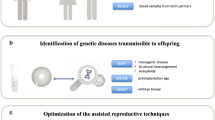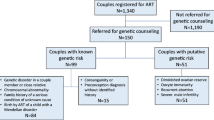Abstract
Purpose of Review
The understanding of genetic contributions to miscarriage and infertility have benefited from advancements in genetic technologies, such as chromosomal microarray and next generation sequencing. Even with these modern tools, there continue to be disparities in management and counseling. This review explores recent genetic advances in reproductive health and provides evidence that genetic counseling by a genetic counselor empowers individuals to make appropriate reproductive decisions based upon their experience and values.
Recent Findings
The standard of care for products of conception testing is now chromosomal microarray. Genetic testing should be considered in cases of low sperm count, premature ovarian failure, and in context of family history. Expanded reproductive options, including preimplantation genetic testing, may increase the chances of live birth in cases of recurrent miscarriage, age-related infertility, and previous failed IVF cycles.
Summary
Modern genetic tools may delineate underlying causes of infertility or miscarriage. In addition to processing the complex emotions related to infertility and miscarriage, patients also value understanding the genetic contributions when making informed decisions about reproductive health.

Similar content being viewed by others
References
Papers of particular interest, published recently, have been highlighted as: • Of importance •• Of major importance
March of Dimes (2017) Available from: https://www.marchofdimes.org/complications/miscarriage.aspx Accessed 17 Feb 2020.
Thoma ME, McLain AC, Louis JF, King RB, Trumble AC, Sundaram R, et al. Prevalence of infertility in the United States as estimated by the current duration approach and a traditional constructed approach. Fertil Steril. 2013;99(5):1324–1331.e1.
ACOG Practice Bulletin No. 200 summary: early pregnancy loss. Obstet Gynecol. 2018;132(5):1311–3.
Practice Committee of the American Society for Reproductive Medicine. Evaluation and treatment of recurrent pregnancy loss: a committee opinion. Fertil Steril. 2012;98(5):1103–11.
Choi TY, Lee HM, Park WK, Jeong SY, Moon HS. Spontaneous abortion and recurrent miscarriage: a comparison of cytogenetic diagnosis in 250 cases. Obstet Gynecol Sci. 2014;57(6):518–25.
Hassold T, Chen N, Funkhouser J, Jooss T, Manuel B, Matsuura J, et al. A cytogenetic study of 1000 spontaneous abortions. Ann Hum Genet. 1980;44(2):151–78.
Goddijn M, Leschot NJ. Genetic aspects of miscarriage. Baillieres Best Pract Res Clin Obstet Gynaecol. 2000;14(5):855–65.
Hardy K, Hardy PJ. 1(st) trimester miscarriage: four decades of study. Transl Pediatr. 2015;4(2):189–200.
Bianco K, Caughey AB, Shaffer BL, Davis R, Norton ME. History of miscarriage and increased incidence of fetal aneuploidy in subsequent pregnancy. Obstet Gynecol. 2006;107(5):1098–102.
Al-Asmar N, Peinado V, Vera M, Remohí J, Pellicer A, Simón C, et al. Chromosomal abnormalities in embryos from couples with a previous aneuploid miscarriage. Fertil Steril. 2012;98(1):145–50.
• Kacprzak M, Chrzanowska M, Skoczylas B, Moczulska H, Borowiec M, Sieroszewski P. Genetic causes of recurrent miscarriages. Ginekol Pol. 2016;87(10):722–6 Summarization of the genetic causes and diagnostic testing for recurrent miscarriage.
Imam SN, Shamsi MB, Kumar K, Deka D, Dada R. Idiopathic recurrent pregnancy loss: role of paternal factors; a pilot study. J Reprod Infertil. 2011;12(4):267–76.
Hanna CW, Bretherick KL, Gair JL, Fluker MR, Stephenson MD, Robinson WP. Telomere length and reproductive aging. Hum Reprod. 2009;24(5):1206–11.
Asadpor U, Totonchi M, Sabbaghian M, Hoseinifar H, Akhound MR, Zari Moradi S, et al. Ubiquitin-specific protease (USP26) gene alterations associated with male infertility and recurrent pregnancy loss (RPL) in Iranian infertile patients. J Assist Reprod Genet. 2013;30(7):923–31.
Hickey SE, Curry CJ, Toriello HV. ACMG practice guideline: lack of evidence for MTHFR polymorphism testing. Genet Med. 2013;15(2):153–6.
Bardos J, Hercz D, Friedenthal J, Missmer SA, Williams Z. A national survey on public perceptions of miscarriage. Obstet Gynecol. 2015;125(6):1313–20.
Brier N. Anxiety after miscarriage: a review of the empirical literature and implications for clinical practice. Birth. 2004;31(2):138–42.
Cumming GP, Klein S, Bolsover D, Lee AJ, Alexander DA, Maclean M, et al. The emotional burden of miscarriage for women and their partners: trajectories of anxiety and depression over 13 months. BJOG. 2007;114(9):1138–45.
Radford EJ, Hughes M. Women’s experiences of early miscarriage: implications for nursing care. J Clin Nurs. 2015;24(11–12):1457–65.
Carter D, Misri S, Tomfohr L. Psychologic aspects of early pregnancy loss. Clin Obstet Gynecol. 2007;50(1):154–65.
Kolte AM, van Oppenraaij RH, Quenby S, Farquharson RG, Stephenson M, Goddijn M, et al. Non-visualized pregnancy losses are prognostically important for unexplained recurrent miscarriage. Hum Reprod. 2014;29(5):931–7.
McCarthy FP, Khashan AS, North RA, Rahma MB, Walker JJ, Baker PN, et al. Pregnancy loss managed by cervical dilatation and curettage increases the risk of spontaneous preterm birth. Hum Reprod. 2013;28(12):3197–206.
Farren J, Jalmbrant M, Ameye L, Joash K, Mitchell-Jones N, Tapp S, et al. Post-traumatic stress, anxiety and depression following miscarriage or ectopic pregnancy: a prospective cohort study. BMJ Open. 2016;6(11):e011864.
Maconochie N, Doyle P, Prior S, Simmons R. Risk factors for first trimester miscarriage--results from a UK-population-based case-control study. BJOG. 2007;114(2):170–86.
Practice Committee of American Society for Reproductive Medicine. Definitions of infertility and recurrent pregnancy loss: a committee opinion. Fertil Steril. 2013;99(1):63.
Youssef A, Vermeulen N, Lashley EELO, Goddijn M, van der Hoorn MLP. Comparison and appraisal of (inter)national recurrent pregnancy loss guidelines. Reprod BioMed Online. 2019;39(3):497–503.
ESHRE Guideline Group on RPL, Bender Atik R, Christiansen OB, Elson J, Kolte AM, Lewis S, et al. ESHRE guideline: recurrent pregnancy loss. Hum Reprod Open. 2018;2018(2):hoy004.
Royal College of Obstetricians and Gynaecologists. The investigation and treatment of couples with recurrent firsttrimester and second-trimester miscarriage (Green-top Guideline No. 17) [Internet]. 2011. Available from: https://www.rcog.org.uk/en/guidelines-research-services/guidelines/gtg17/. Accessed 13 Jan 2020.
Lathi RB, Gustin SLF, Keller J, Maisenbacher MK, Sigurjonsson S, Tao R, et al. Reliability of 46,XX results on miscarriage specimens: a review of 1,222 first-trimester miscarriage specimens. Fertil Steril. 2014;101(1):178–82.
Priya PK, Mishra VV, Roy P, Patel H. A study on balanced chromosomal translocations in couples with recurrent pregnancy loss. J Hum Reprod Sci. 2018;11(4):337–42.
Crotti L, Tester DJ, White WM, Bartos DC, Insolia R, Besana A, et al. Long QT syndrome-associated mutations in intrauterine fetal death. JAMA. 2013;309(14):1473–82.
Zegers-Hochschild F, Adamson GD, de Mouzon J, Ishihara O, Mansour R, Nygren K, et al. International Committee for Monitoring Assisted Reproductive Technology (ICMART) and the World Health Organization (WHO) revised glossary of ART terminology, 2009. Fertil Steril. 2009;92(5):1520–4.
American College of Obstetricians and Gynecologists Committee on Genetics. ACOG Committee Opinion No. 486: update on carrier screening for cystic fibrosis. Obstet Gynecol. 2011;117(4):1028–31.
Barasoain M, Barrenetxea G, Huerta I, Télez M, Criado B, Arrieta I. Study of the genetic etiology of primary ovarian insufficiency: FMR1 gene. Genes (Basel). 2016;7(12).
Kumar N, Singh AK. Trends of male factor infertility, an important cause of infertility: a review of literature. J Hum Reprod Sci. 2015;8(4):191–6.
Said TM, Ranga G, Agarwal A. Relationship between semen quality and tobacco chewing in men undergoing infertility evaluation. Fertil Steril. 2005;84(3):649–53.
Harton GL, Tempest HG. Chromosomal disorders and male infertility. Asian J Androl. 2012;14(1):32–9.
Meng MV, Black LD, Cha I, Ljung BM, Pera RA, Turek PJ. Impaired spermatogenesis in men with congenital absence of the vas deferens. Hum Reprod. 2001;16(3):529–33.
Wosnitzer MS. Genetic evaluation of male infertility. Transl Androl Urol. 2014;3(1):17–26.
Yu J, Chen Z, Ni Y, Li Z. CFTR mutations in men with congenital bilateral absence of the vas deferens (CBAVD): a systemic review and meta-analysis. Hum Reprod. 2012;27(1):25–35.
Oktay K, Harvey BE, Partridge AH, Quinn GP, Reinecke J, Taylor HS, et al. Fertility preservation in patients with cancer: ASCO clinical practice guideline update. J Clin Oncol. 2018;36(19):1994–2001.
Hamilton BE, Martin JA MPH, Osterman MJK, Rossen LM. Births: provisional data for 2018. National Center for Health Statistics (U.S.). Division of Vital Statistics., editor. 2019; Available from: https://stacks.cdc.gov/view/cdc/78430. Accessed 10 Feb 2020.
Jones BP, Saso S, Mania A, Smith JR, Serhal P, Ben NJ. The dawn of a new ice age: social egg freezing. Acta Obstet Gynecol Scand. 2018;97(6):641–7.
Wunder D. Social freezing in Switzerland and worldwide--a blessing for women today? Swiss Med Wkly. 2013;143:w13746.
Centers for Disease Control and Prevention (2017) Assisted Reproductive Technology Fertility Clinic Success Rates Report. 2019
Hodes-Wertz B, Grifo J, Ghadir S, Kaplan B, Laskin CA, Glassner M, et al. Idiopathic recurrent miscarriage is caused mostly by aneuploid embryos. Fertil Steril. 2012;98(3):675–80.
Sato T, Sugiura-Ogasawara M, Ozawa F, Yamamoto T, Kato T, Kurahashi H, et al. Preimplantation genetic testing for aneuploidy: a comparison of live birth rates in patients with recurrent pregnancy loss due to embryonic aneuploidy or recurrent implantation failure. Hum Reprod. 2019;34(12):2340–8.
•• Osman EK, Werner MD. Mosaic embryos present a challenging clinical decision. Fertil Steril. 2019;111(1):52–3 Demonstration of the critical role genetic counseling plays in the informed decision-making process for traditional prenatal genetic counseling as well as emerging topics such as mosaic embryo transfer.
Huang C, Jiang W, Zhu Y, Li H, Lu J, Yan J, et al. Pregnancy outcomes of reciprocal translocation carriers with two or more unfavorable pregnancy histories: before and after preimplantation genetic testing. J Assist Reprod Genet. 2019;36(11):2325–31.
ASRM Press Release. Preimplantation genetic testing for chromosomal defects improves IVF outcomes in patients with recurrent pregnancy loss. 2019.
Murugappan G, Shahine LK, Perfetto CO, Hickok LR, Lathi RB. Intent to treat analysis of in vitro fertilization and preimplantation genetic screening versus expectant management in patients with recurrent pregnancy loss. Hum Reprod. 2016;31(8):1668–74.
National Society of Genetic Counselors (2019) Professional status survey 2019: Work environment
Helm BM. Exploring the genetic counselor’s role in facilitating meaning-making: rare disease diagnoses. J Genet Couns. 2015;24(2):205–12.
Waxler JL, Cherniske EM, Dieter K, Herd P, Pober BR. Hearing from parents: the impact of receiving the diagnosis of Williams syndrome in their child. Am J Med Genet A. 2013;161A(3):534–41.
Austin J, Semaka A, Hadjipavlou G. Conceptualizing genetic counseling as psychotherapy in the era of genomic medicine. J Genet Couns. 2014;23(6):903–9.
•• Accreditation Counsel for Genetic Counseling (2019) Practice-based competencies for genetic counselors. Description of the practice-based competencies; an entry-level practitioner must demonstrate to successfully provide genetic counseling.
Author information
Authors and Affiliations
Corresponding author
Ethics declarations
Conflict of Interest
All authors declare no conflicts of interest relevant to the article.
Human and Animal Rights and Informed Consent
This article does not contain any studies with human or animal subjects performed by any of the authors.
Additional information
Publisher’s Note
Springer Nature remains neutral with regard to jurisdictional claims in published maps and institutional affiliations.
This article is part of the Topical Collection on Counseling and Testing
Rights and permissions
About this article
Cite this article
Flanagan, J.D., Johnson, E.A., Kragenbring, R.L. et al. When the Path to Parenthood Does Not Go as Planned: Genetic Counseling for Infertility and Miscarriage. Curr Genet Med Rep 8, 101–108 (2020). https://doi.org/10.1007/s40142-020-00189-5
Published:
Issue Date:
DOI: https://doi.org/10.1007/s40142-020-00189-5




